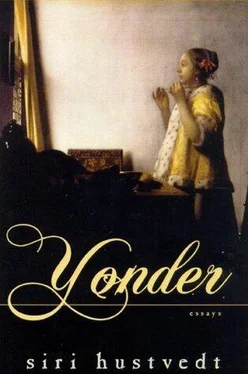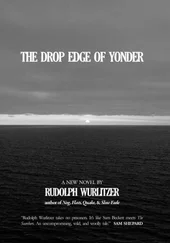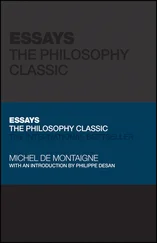I have memories of that first trip to Norway, too. The most striking is one of light and color. I am sitting outside at a table with my sister and my mother and my aunt. My cousins were probably there as well, but I have no memory of them. The sunshine is so brilliant I have to squint. We are close to water. I have no idea whether it was a fjord near Bergen or the ocean off Mandal. It’s water and it’s blue. It’s probably the fjord, because I do not remember vastness or a beach but trees and rocks. The table is white, and on the table are glasses of shining soda pop — yellow and red. Those glasses of brus (the Norwegian word for soda pop, a word I never forgot) delight and fascinate me. I am quite sure that I’d never seen red soda before, and the memory is so powerful, I must have felt I was in the presence of a Norwegian miracle. That bottle of red brus on a white table gleamed throughout the remaining years of my childhood as the sign of what was possible there. It may have been in part responsible for the question I asked my mother when I was five or six: “Why is everything better in Norway?” I don’t remember asking the question, but my mother assures me I was tactless enough to ask it. My poor mother decided that she had framed her emigration in the wrong light and vowed to be more careful about her comparisons between the two countries in the future.
Early memories are isolated bits of experience remembered for reasons that are often difficult to articulate; and because they have no greater narrative in which they can be framed, they float. At the same time, they may have more purity than later memories, for that very reason. When dailiness enters memory, repetition fixes places in the mind, but it also burdens them with a wealth of experience that is often difficult to untangle. For example, I remember Longfellow School, where I attended grade school, very well. I can see its hallways and connect one to another. I can even see the bathroom outside my third-grade class. I remember it as gray. It may have been gray, but it could be that I colored it in memory. I have given the interior of that building a single color that is also emotional: gray. Although I was always excited to begin school in the fall (a season separated from the spring before by years of summer), and although I loved walking out to the school-bus with my three sisters, wearing the identical new dresses my mother had sewn for us, my memory of the school building itself, its rooms and lockers, blackboards, and hallways, brings on a heavy, oppressive feeling. Whether I was more unhappy in school than any of my friends, I don’t know. I never would have said I didn’t like school, and there are moments I distinctly remember enjoying, but these truths don’t alter my memory of that place. There’s something unpleasant about saying that a gut response can be a lie, but I think it’s possible. Unlike the intricacy of the physical world, feelings are generally more crude than language — guilt, shame, being hurt by another person feel remarkably alike in the body. Reason tells me that my early experiences in that school were a complex mixture of pain, pleasure, and boredom, but whenever I drive past it or think about it, the building itself is wrapped in gloom.
Many years later, I had a similar experience but in reverse. From 1978 through 1986, I was a graduate student at Columbia, but by 1981 I had met my future husband and moved first to SoHo, in downtown Manhattan, and then to Brooklyn. It is true that those first couple of years, when I was living near Columbia, I was very poor. It is true that I suffered in a difficult and stupid love affair, and that I worked in one bad job after another to try to keep myself going. Nevertheless, I remember that time as extraordinary, and I wouldn’t trade it for anything. I don’t even wish now that I had had more money. And had I been asked if I was suffering at the time, I would have said a defiant no. After I left that neighborhood, however, I rarely returned to it. I saw my dissertation adviser three times in three years and then defended on a clear spring day in 1986. After that, I disappeared for good. Several years later, I returned, because my husband, Paul Auster, had been asked to give a talk at the Maison Française. Walking across campus made me feel sad, and I thought to myself, I wasn’t happy here. Then after the reading, we walked past Butler Library. It was dark, but the light inside illuminated the windows. Students were reading and working, and those lit windows gave me a wonderful, weightless feeling. I understood for the first time how happy I had been there — in the library. Butler is a good library, one of the best. It has some handsome rooms, but its stacks are inhospitable and dark. One spring while I was a student, all the women were given whistles before they entered the stacks, because an exhibitionist had been prowling the badly lit corridors, and we were told to pucker up and blow if there was any trouble. Again, I don’t fully understand my emotional response to that library or trust it. It was the site of a series of intellectual revelations that were crucial to me, not just as a student but as a human being. I read Sigmund Freud in that library and Emile Benveniste and Roman Jakobson and Mikhail Bakhtin and was forever changed by them, but I also sweated out bad papers and was bored and troubled and irritated there. My mind wandered from the work at hand and strayed to food or clothes I couldn’t afford or to the attractive arms and shoulders of some young man sitting at the far end of the table. So what does it mean that the sight of Butler Library turned me into a quivering heap of sentimental mush? It can only be that places left behind often become emotionally simplified — that they sound a single note of pain or pleasure, which means that they are never what they were.
At the same time, I’m fully aware that libraries occupy a particular place in my life, and my sudden burst of feeling for Butler isn’t related only to my life as a graduate student. My father took me and my sisters into the dim, dusty stacks on the seventh floor of Rolvaag Library at St. Olaf, where he worked for the historical association. To get there, we walked into an old elevator with a bright red door and a grate that folded and unfolded with lots of creaking and banging. I was already a heroine then, Alice or Pollyanna or a generic princess from a fairy tale — and the trip into that landscape of book spines and bad light made me feel like a person in a story on some curious adventure. It may be that I link every library to that first one — to my early childhood experience of drawing on the floor near my father’s desk. A library is of course a real place, but it is also an unreal one. What happens there is mostly silent. I think I’ve always liked the whispering aspect of libraries, the hushing librarians and my feeling of solitude among many. When her children were older, my mother worked part-time in the St. Olaf library, too. She was employed there when I was a student. I didn’t sleep in Rolvaag Library, but most of my waking hours were spent in a carrel there, and sometimes she would come to see me. I would feel her hands on my shoulders and turn my head, knowing I was going to see my mother. Years before she found herself filing periodicals in that library, she found books for me. It was my Norwegian mother, not my American father, who introduced me to the English poems and novels that affected me most when I was young. She gave me Blake’s Songs of Innocence and Experience when I was eleven. I didn’t understand those poems, but they fascinated me as much as Alice in Wonderland had, and I read them again and again with mingled horror and pleasure. She gave me Emily Dickinson, too, around the same time, a tiny green edition of famous poems, and I would repeat those poems to myself in a trance. They were secrets to me, strange and private. I think it was the sound of those poems that I loved. I chewed on Blake’s and Dickinson’s words like food. I ate them, even when their meanings eluded me.
Читать дальше












